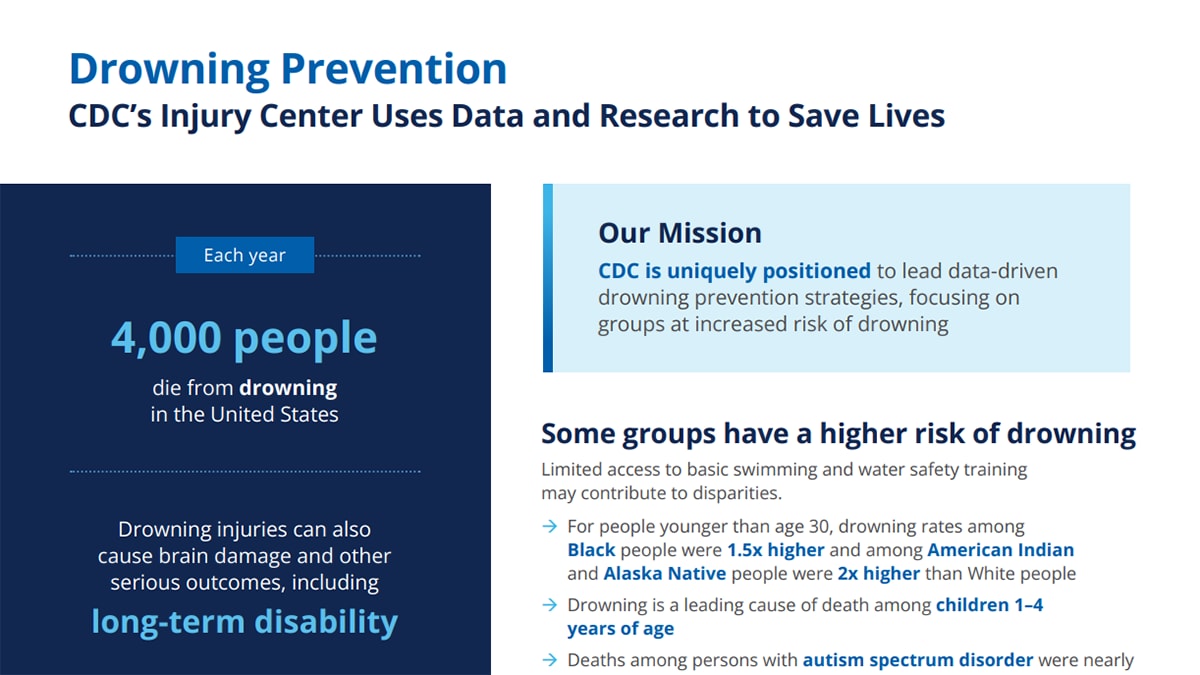At a glance
View the latest injury and violence prevention resources from the CDC Injury Center. Learn about preventing suicide, overdose, drowning, older adult falls, and violence.

Suicide prevention
Suicide is a serious public health problem that can have long-lasting effects on individuals, families, and communities. The good news is that suicide is preventable. The CDC Injury Center uses data, research, and partnerships to identify and implement effective suicide prevention strategies to foster healthy and resilient communities across the United States.

National Strategy for Suicide Prevention
The 2024 National Strategy for Suicide Prevention is a bold new 10-year, comprehensive, whole-of-society approach to suicide prevention that provides concrete recommendations for addressing gaps in the suicide prevention field.
Comprehensive Suicide Prevention Program
CDC's Comprehensive Suicide Prevention Program (CSP) funds 24 programs to implement and evaluate a comprehensive public health approach to suicide prevention. Funding also supports near real-time collection of emergency department data for suicide attempts and suicidal ideation.
Overdose prevention
Drug overdoses impact families, communities, workplaces, and the economy. The CDC Injury Center works to prevent overdoses and substance use-related harms.
View the DOSE and SUDORS data dashboards to see the most up-to-date data on overdoses. For more overdose, injury, and violence data sources, visit Data Statistics, and Reporting.
Xylazine
Xylazine is a non-opioid sedative or tranquilizer that is increasingly being found in the US illegal drug supply and linked to overdose deaths
Stimulant overdose
Stimulants include methamphetamine, cocaine, crack cocaine, and amphetamines, such as medications prescribed for the treatment of ADHD. Stimulant-involved overdose deaths have risen in recent years.
View the Stimulant Guide below to find answers to emerging questions about stimulants in the context of the overdose epidemic in the United States.

Drowning prevention
Over 4,500 people drowned each year in the United States from 2020–2022. This is about 500 more drowning deaths each year compared to 2019. Drowning is preventable. View the At-a-Glance document below to see how CDC uses data and research to prevent drowning and save lives.

Older adult fall prevention
Falls are the leading cause of injury and injury death among Americans ages 65 and older (older adults). The Older Adult Fall Prevention At-a-Glance [PDF-1 page] shows how CDC empowers healthcare providers, public health agencies, older adults, and caregivers to help maintain the health and independence of older adults by preventing falls.

- Older Adult Fall Prevention provides the latest falls data, effective fall prevention interventions, and fall prevention resources.
- The Still Going Strong campaign provides empowering tips for older adults, caregivers, and healthcare professionals on preventing common injuries as we age, as well as a partner toolkit for public health practitioners with campaign assets.
- Stopping Elderly Accidents, Deaths, and Injuries (STEADI) provides tools and resources for healthcare providers to reduce fall risk in their older patients, along with patient and caregiver resources.
Resources for action
Resources for Action can help states and communities use the best available evidence to prevent:
- Adverse childhood experiences
- Child abuse and neglect
- Community violence
- Intimate partner violence
- Sexual violence
- Suicide
- Youth violence
VetoViolence
CDC's VetoViolence website has interactive tools, trainings, and resources to help you and your community stop violence now and prevent it in the future.

Adverse Childhood Experiences: ACEs Trainings and Resources
Explore tools, trainings, and resources to help you prevent early adversity and create positive childhood experiences. Each resource will give you insights and skills to ensure all children and families have safe, stable, and nurturing relationships and environments.
News and updates
Stay up-to-date with the latest information by subscribing to Injury Center's newsletters:
- Go to the CDC subscription tool.
- Search for the topic below that you're interested in and check "Subscribe".
- Enter your email and click "Subscribe".
Topics:
- Core State Violence and Injury Prevention Program
- Drowning Prevention
- Drug Overdose News
- Injury Center Funding Announcements
- Injury Statistics Query & Reporting System
- Motor Vehicle Safety
- Older Adult Falls
- Suicide Prevention
- Traumatic Brain Injury
- Veto Violence Digest
- Violence Prevention



